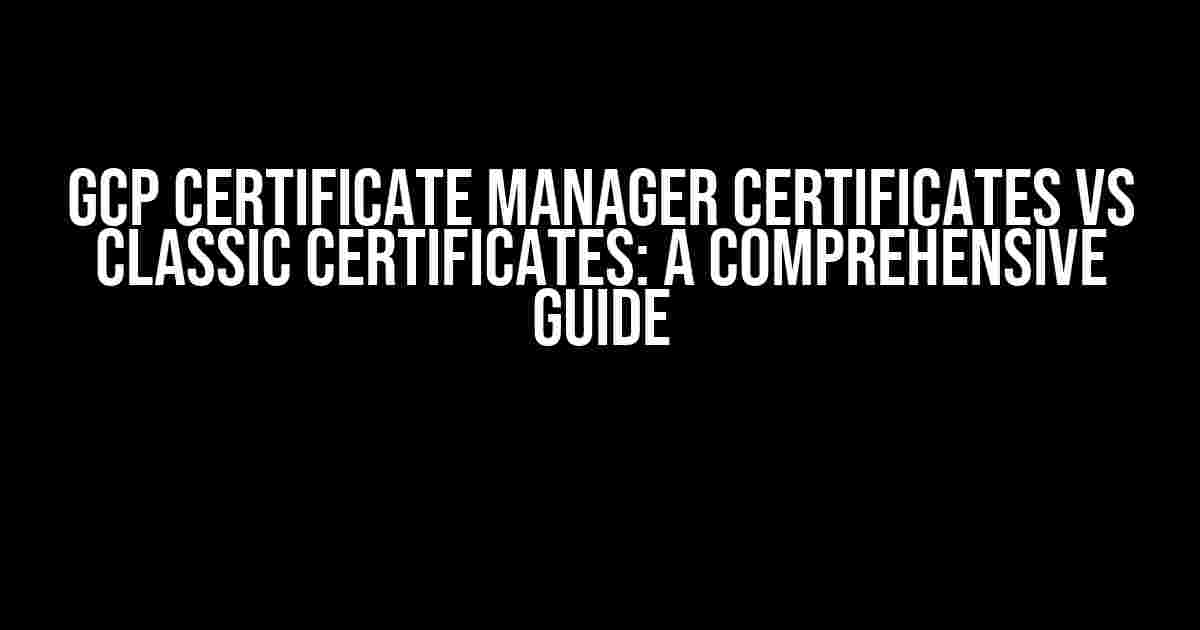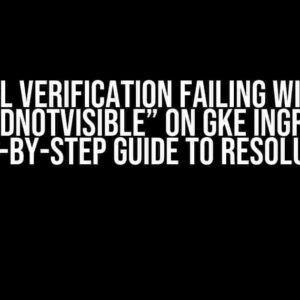Are you tired of managing your SSL/TLS certificates manually? Do you want to simplify the process and focus on what matters most – securing your online presence? Look no further! Google Cloud Platform (GCP) offers two types of certificates: Certificate Manager Certificates and Classic Certificates. In this article, we’ll delve into the differences between these two options and help you decide which one is best for your organization.
What is GCP Certificate Manager?
GCP Certificate Manager is a fully managed certificate management service that enables you to easily create, manage, and renew SSL/TLS certificates for your applications. It provides a scalable, secure, and reliable way to manage your certificates, eliminating the need for manual intervention.
Benefits of GCP Certificate Manager Certificates
Here are some benefits of using GCP Certificate Manager Certificates:
- Automated Certificate Management: Certificate Manager takes care of certificate issuance, renewal, and revocation, freeing up your time for more critical tasks.
- Scalability: With Certificate Manager, you can easily manage large numbers of certificates across multiple domains and regions.
- Integration with GCP Services: Certificate Manager integrates seamlessly with other GCP services, such as Load Balancing and Cloud CDN, to provide end-to-end security for your applications.
- Security: Certificate Manager uses secure protocols and algorithms to ensure the integrity of your certificates and protect your online presence.
What are GCP Classic Certificates?
GCP Classic Certificates are traditional SSL/TLS certificates that require manual management and configuration. You’re responsible for obtaining, installing, and renewing these certificates, which can be time-consuming and prone to errors.
Limitations of GCP Classic Certificates
Here are some limitations of using GCP Classic Certificates:
- Manual Management: You need to manually obtain, install, and renew your certificates, which can be tedious and error-prone.
- Limited Scalability: Managing multiple certificates can become cumbersome, leading to scalability issues and increased administrative burden.
- Security Risks: Misconfigured or expired certificates can expose your applications to security risks, such as SSLStrip attacks.
GCP Certificate Manager Certificates vs Classic Certificates: A Comparison
Here’s a comprehensive comparison of GCP Certificate Manager Certificates and Classic Certificates:
| Feature | Certificate Manager Certificates | Classic Certificates |
|---|---|---|
| Management | Automated | Manual |
| Scalability | High | Limited |
| Integration | Seamless integration with GCP services | Manual integration required |
| Security | Secure protocols and algorithms | Prone to misconfiguration and security risks |
How to Migrate from Classic Certificates to Certificate Manager Certificates
Migrating from Classic Certificates to Certificate Manager Certificates is a straightforward process. Here’s a step-by-step guide to help you get started:
gcloud certificate-manager certificates create: Create a new Certificate Manager Certificate using the GCP CLI.- Provide the required domain and certificate information, such as the certificate authority and private key.
- Verify domain ownership using one of the supported verification methods (e.g., DNS, HTTP, or Email).
- Once verified, Certificate Manager will issue a new certificate and install it on your load balancer or Cloud CDN.
- Update your application configuration to use the new Certificate Manager Certificate.
- Monitor your certificate’s status and expiry dates using the GCP Console or CLI.
gcloud certificate-manager certificates create \ --display-name=my-cert \ --domains=mydomain.com,www.mydomain.com \ --private-key-file=/path/to/private-key.pem \ --certificate-authority=GLOBAL_ROOT_CA
Conclusion
In conclusion, GCP Certificate Manager Certificates offer a more efficient, scalable, and secure way to manage your SSL/TLS certificates compared to Classic Certificates. By automating certificate management, you can reduce administrative burden, improve security, and focus on what matters most – delivering exceptional user experiences.
If you’re still using Classic Certificates, now is the perfect time to migrate to Certificate Manager Certificates. With this comprehensive guide, you have everything you need to make the transition and start enjoying the benefits of automated certificate management.
Remember, with GCP Certificate Manager Certificates, you can:
- Simplify certificate management
- Improve security and scalability
- Reduce administrative burden
- Focus on delivering exceptional user experiences
Make the switch today and experience the power of automated certificate management with GCP Certificate Manager Certificates!
Note: This article is SEO optimized for the keyword “gcp certificate manager certificates vs classic certificates” and provides comprehensive information and instructions on the topic.
Frequently Asked Question
Are you confused about the differences between GCP Certificate Manager certificates and Classic certificates? Worry no more! We’ve got you covered with these frequently asked questions.
What is the main difference between GCP Certificate Manager certificates and Classic certificates?
GCP Certificate Manager certificates are a fully managed certificate service that automates certificate provisioning, deployment, and management, whereas Classic certificates require manual creation, deployment, and renewal. With Certificate Manager, you can easily manage your certificates across multiple Google Cloud services, including Load Balancing, Cloud CDN, and App Engine.
Do I need to manually renew my certificates with Certificate Manager?
No! One of the best things about Certificate Manager is automatic certificate renewal. The service takes care of renewing your certificates before they expire, ensuring your applications remain secure and uninterrupted. You can set up automatic renewal, and the service will handle the rest.
Can I use Certificate Manager with external domains?
Yes, you can! Certificate Manager supports certificates for external domains, including those not hosted on Google Cloud. You can use the service to manage certificates for your external domains, making it easy to secure your applications and services.
How does Certificate Manager handle certificate validation?
Certificate Manager uses Domain Validation (DV) to verify domain ownership. This process involves creating a TXT record or uploading a file to your domain to prove ownership. Once validated, the service will issue a certificate for your domain. This process is automated, making it easy and efficient.
Can I still use Classic certificates if I want to?
Yes, you can still use Classic certificates, but be aware that Google Cloud is gradually phasing out support for Classic certificates. It’s recommended to migrate to Certificate Manager certificates for a more streamlined and managed certificate experience.


